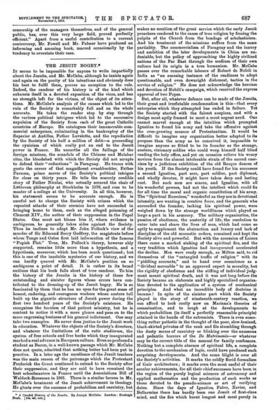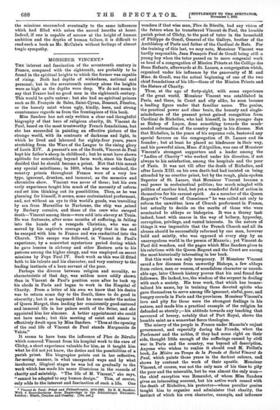THE JESUIT BOGEY.*
IT seems to be impossible for anyone to write impartially about the Jesuits, and Mr. McCabe, although he insists again and again on the purity of his intentions and obviously does his best to fulfil them, proves no exception to the rule. Indeed, the candour of his history is of the kind which exhausts itself in a devoted exposition of the vices, and has no strength left for the virtues, of the object of its atten- tions. Mr. McCabe's analysis of the causes which led to the ruin of the Society is remarkably full and on the whole accurate. He takes the reader step by step through the various political intrigues which led to the successive expulsion of the Society from each of the great Catholic countries of Europe. He catalogues their innumerable com- mercial enterprises, culminating in the bankruptcy of the Superior at Antilles, Father Lavalette, and the repudiation by the Society of his half a million of debt—a proceeding the cynicism of which really put an end to the Jesuit power in France. He unearths all the failings of the foreign missions, the scandals of the Chinese and Malabar rites, the bloodshed with which the Society did not scruple to defend their " reductions " in Paraguay. He traces with gusto the career of that magnificent swashbuckler, Father Parsons, prime mover of the Society's political intrigue for close on thirty years. He tells the scarcely credible story of Father Nicolai, who actually secured the chair of Lttheran philosophy at Stockholm in 1576, and rose to be master of a college at the University. In all this, however, his statement seems to be accurate enough. He is careful not to charge the Society with crimes which the repeated attacks of their enemies have not succeeded in bringing home to them, such as the alleged poisoning of Clement XIV., the author of their suppression in the Papal States. One must not blame him if, where evidence is ambiguous, he generally takes sides against the Society. Thus he inclines to adopt Mr. John Pollock's view of the murder of Sir Edmund Berry Godfrey, the magistrate before whom Tonge and Oates first laid information of the famous "Popish Plot." True, Mr. Pollock's theory, however ably supported, remains little more than a hypothesis, and a hypothesis, moreover, which has been much questioned ; but this is one of the insoluble mysteries of our history, and we can hardly quarrel with Mr. McCabe's position on so ambiguous a point of detail. It is rather in its broad outlines that his book falls short of true candour. To him the history of the Jesuits is the history of those few outstanding and sinister figures whose errors have con- tributed to the dressing-up of the Jesuit bogey. He is so fascinated by them that he has no eyes for the great mass of honest, enduring, and courageous workers whose austere toil built up the gigantic structure of Jesuit power during the first two hundred years of the Society's existence. He recognizes the heroism of that patient ministry, but he is content to notice it with a mere glance and pass on to the more engrossing business of his general indictment. One may take two examples. He never does justice to the Jesuit work in education. Whatever the objects of the Society's directors, and whatever the limitations of the ratio studiorum, the system of free schools and free books which they inaugurated marked a real advance in European culture. Even so profound a student as Bacon, in a well-known passage which Mr. McCabe does not quote, admitted that nothing better had been put in practice. In a later age the excellence of the Jesuit teachers was the main reason of the patronage which the Protestant Frederick the Great continued to extend to the Society after their suppression, and they are said to have remained the best schoolmasters in France until the Associations Bill of Waldeck-Rousseau in 1901. There is a similar lacuna in Mr. McCabe's treatment of the Jesuit achievement in theology. He gloats over the excesses of probabilism and casuistry, but • A Camlid Hiatory of the Jesuits. By Joseph McCabe. London : Eveleigh Nash. [10s. ficl. net.]
makes no mention of the great service which the early Jesuit preachers rendered to the cause of true religion by freeing the pulpits of the Church from the bondage of scholasticism. And his treatment of the missions suffers from the same partiality. The commercialism of Paraguay and the luxury and ambition of the later developments in China are un- deniable, but the policy of approaching the highly civilized nations of the Far East through the medium of their own culture had its origin in a true humanism. Mr. McCabe passes over the remarkable labours of Robert de Nobili in India as "an amusing instance of the readiness to adopt questionable, and even downright dishonest, tactics in the service of religion." He does not acknowledge the heroism and devotion of Nobili's campaign, which received the express approval of two Popes.
But, after all, whatever defence can be made of the Jesuits, their great and irrefutable condemnation is this—that every enterprise which they attempted has ended in failure. Yet the Society started with the fairest auspices, and with a design most aptly framed to meet a most urgent need. One cannot marvel enough at the intuition which prompted Ignatius to found his army and take the offensive against the ever-growing menace of Protestantism. It would be difficult to imagine any organization better adapted to its purpose than the army as he conceived it, impossible to imagine anyone so fitted to be its founder as the strange, austere, visionary soldier who could weep himself half blind reading the holy office, and yet on occasion relieve his weary novices from the almost intolerable strain of the sacred exer- cises by a judicious exhibition of the old Basque dances of his youth. If the Society could have found for his successor a second Ignatius, part seer, part soldier, part diplomat, and wholly devotee, it might have taken deep and lasting root. But such men are scarce, and Ignatius, with all his wonderful powers, had not the intellect which could fix for all time the moral and organic constitution of his army. The "Spiritual Exercises," wonderful as they are in devotional intensity, are wanting in creative force, and the generals who succeeded the founder, lacking his spiritual power, were weighed down by the strange worldliness which played so large a part in his armoury. The military organization, the passion of obedience, the austerity of life, the resolution to enter into and share the lives of men, which had come so aptly to supplement the abstraction and luxury and lack of discipline of the old monastic orders, remained and kept the Society alive and powerful. But with the accession of Lainez there came a marked sinking of the spiritual fire, and the very tradition which Ignatius had inaugurated accelerated the decline. Men were ready enough, as Milton said, to rid themselves of the "entangled traffic of religion" with its "piddling accounts," and to hand over conscience as a " dividual moveable" to an approved expert in morality, but the rigidity of obedience and the stifling of individual judg- ment meant spiritual death, and it was not long before the Society became an elaborate and highly specialized organiza- tion devoted to the application of a system of mechanical principles. And what an incredible body of doctrine it became ! In spite of the sinister part which the Society played in the story of nineteenth-century reaction, we can afford to look coolly now on Mariana's theories of assassination, and to laugh at the developments to which probabilism (in itself a perfectly reasonable principle) attained in the hands of the extremists. There is even some- thing rather pathetic in the thought of the poor, slow-brained, black-skirted privates of the rank and file stumbling through the dusty mazes of casuistry or blinking over the nauseous and pedantic horrors of the De Matrimonio—or whatever may be the correct title of the manual for family confessors. Nothing but a complete absence of spiritual life, a complete devotion to the mechanism of logic, could have produced such surprising developments. And the same blight is over all the Society's activities. It marks the coldly florid formalism of their architecture ; it marks even the most useful of their secular achievements, for all their chief successes have been in the region of the purely logical sciences of astronomy and applied mathematics and the production of such works as those devoted to the pseudo-science or art of verifying dates. Since the days of Ignatius, Fabre, Xavier, and Bellarmine there has hardly been one Jesuit of first-class mind, and the fire which burnt longest and most purely in
the missions succumbed eventually to the same influences which had filled with ashes the sacred hearths at home. Indeed, if one is capable of sorrow at the height of human ambition and the depths of human failure, it is difficult to read such a book as Mr. McCabe's without feelings of almost tragic sympathy.































































 Previous page
Previous page